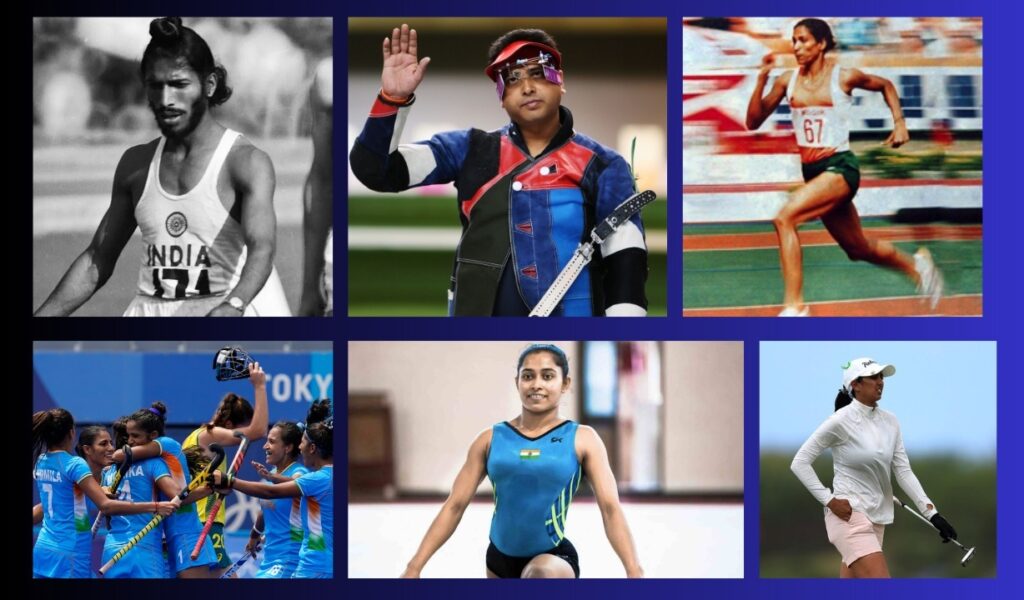
In real life, what best explains the phrase ‘so near, yet so far’? There can be many answers, from different walks of life. Looking through the lens of sports, ‘fourth-place finish in an Olympic event’ comes close to elucidating what it means and how it feels when something within touching distance suddenly becomes distant. It’s very different from finishing fifth.
Chasing a medal he or she has wanted for ages, sacrificing normal life for it and putting in the hard yards for years. And then they see the prize dangling in front of them. “You have done 90 per cent of the job, now finish it off,” they tell themselves. Whether it is pressure or overconfidence, a nervous breakdown or the superiority of the athlete overtaking the podium hopeful, it’s difficult to say. But that last-gasp heartbreak takes time to heal, if it ever does.
Starved of an individual Olympic medal from 1952 to 1996, and with the hockey glory gradually fading, Indians found solace in two fourth-place finishes. Milkha Singh lost the 400m final at the 1960 Olympics in Rome. He was one of the favourites, and led for a considerable distance, but failed to close it out. Twenty-four years after that, the stage was Los Angeles. One morning, India woke up to the shattering news of PT Usha finishing 0.01 of a second behind the bronze medallist in the 400m hurdles final.
Accolades were showered on Milkha and Usha. They remain among India’s most revered athletes of all time, with good reason. There was no overseas exposure-cum-training trips in those days. Scientific inputs were minimal. They lacked a lot of things that athletes from stronger nations enjoyed. Yet, to run them close and finish agonisingly short was sensational. Both were multiple-gold winners at the Asian level, but they are superheroes because they came fourth at the Olympics. There is a film on Milkha. Another on Usha was in the pipeline before things came to a standstill.
The miraculous fourth
For me, the most stunning fourth-place finish by an Indian was Dipa Karmakar’s. To become a top-level gymnast was and still is quite unheard of in our country. Dipa came from Tripura, where the infrastructure is sub-zero. From there to performing the rarest of rare vaults called the Produnova and taking the world by storm was miraculous. Milkha and Usha were household names in Asian athletics and multiple-gold winners at the continental level. Dipa was a nobody. And when someone like her comes so close to an Olympic medal in a discipline in which her country had no history or pedigree, it has to be hailed as an unreal effort.
How India reacts to fourth place these days presents an interesting picture of how the hopes, expectations, aspirations and confidence levels have headed north – of the athletes, administrators and fans. Indians have started winning medals. After 44 years of drought, Leander Paes broke the sequence in 1996. In the last three editions, Indians have logged 15 medals, including a bronze won by the men’s hockey team. We have two individual gold medallists. Finishing fourth does not create melancholy anymore. The romanticism associated with ‘so near, yet so far’ has gone.
Also Read: Neeraj Chopra and a 100-Year-Old Dream
Every Indian sports follower is aware of the deeds of Milkha and Usha. How many know that in the last two Olympic Games, there were six instances of Indians finishing fourth? A country that worshipped near-misses for decades has decided to do away with tragic heroes. Everybody wants medals because the nation has got a taste of it, even from uncharted territories like athletics, thanks to Neeraj Chopra. Few remember that Abhinav Bindra, Olympic champion in 2008, finished fourth in 2016, or that Aditi Ashok missed a medal in the women’s golf event by a whisker in 2021.
This is a good sign. Milkha and Usha performed in an era when the Olympic podium was beyond the dreams of most Indian athletes. There was more hope than realistic expectations. In that context, what they did was phenomenal. But times have changed. There are many facilities for top athletes. They get funds to train abroad, for personal foreign coaches, scientific diet and monitoring. There is corporate support as well. So they ought to do better, and the graph is indeed nudging upward.
The fourth-place finish losing charm and value means the bar has been raised. It shows that things have moved in the right direction. Once, the prefix ‘Olympian’ used to draw respect. Now, a mere ‘Olympian’ does not mean what it used to. One has to be an ‘Olympic medallist’ to command esteem. Fourth place losing prestige is an extension of that. Milkha and Usha will remain in the pantheon of legends. For the rest, it’s a different story, and evidence of how success changes perceptions.
Fourth-place finishers
Indians in 2016 & 2021
2016: Abhinav Bindra (10m air rifle); Sania Mirza & Rohan Bopanna (tennis, mixed doubles); Dipa Karmakar (gymnastics, vault).
2021: Women’s hockey team; Aditi Ashok (women’s golf); Deepak Punia (freestyle wrestling, 86kg).
Also Read: PV Sindhu: The Story of India’s Wonder Woman in Rio



